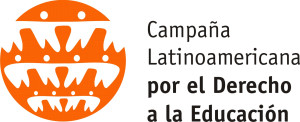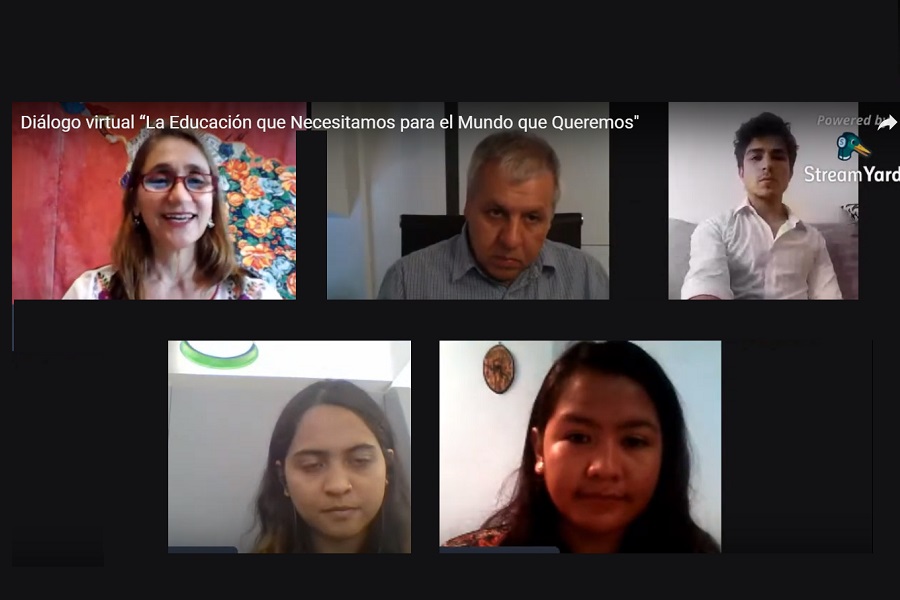
Experts and youths talk about the right to education in Latin America and the Caribbean
March 16, 2020“The Education We Need for the World We Want: views from adolescents and youths in Latin America and the Caribbean” was the title of the virtual conversation held by the Latin American Campaign for the Right to Education (CLADE), with the participation of youths and authorities from Latin America and the Caribbean, who stressed challenges and proposals to ensure the right to education in this region.
(more…)
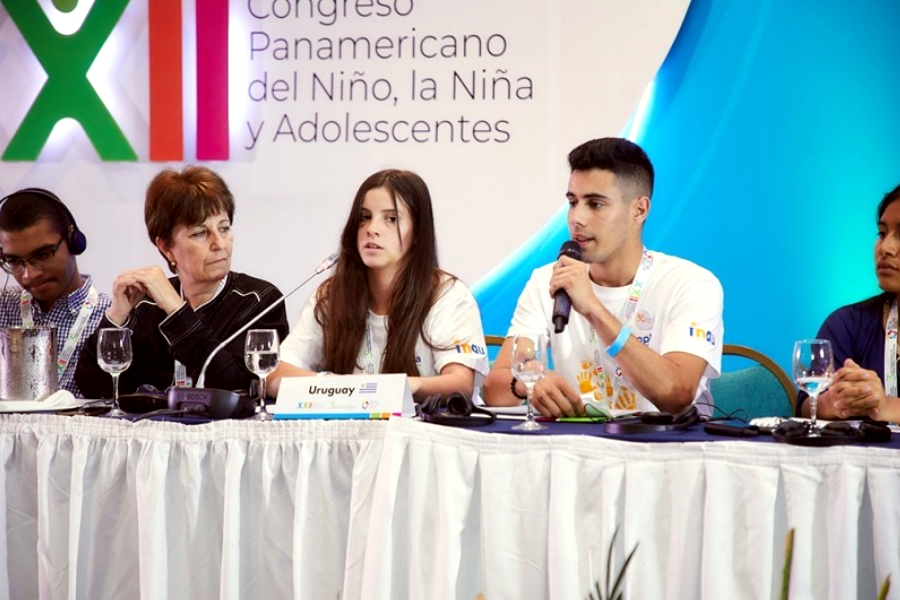
What are Latin America and Caribbean students’ thoughts on education and other human rights?
November 11, 2019Overcoming discrimination and violence, the right to play, art and recreation, gender equality and the right to comprehensive sexuality education and to participate in the debates on public policies affecting them: these were some of the demands shared by boys, girls, adolescents and youths during the 22nd Pan-American Child Congress and the Third Pan-American Child Forum that were held from Oct. 29-31 in Cartagena (Colombia).
(more…)
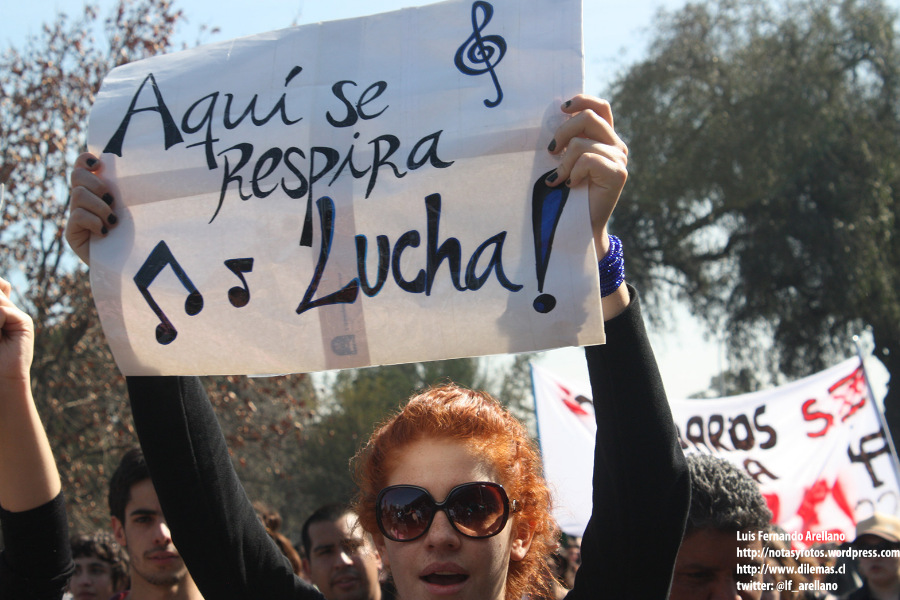
Youth from Latin America and the Caribbean transforming education
August 12, 2019In 1999, United Nations General Assembly appointed August 12 as the International Youth Day, an annual celebration aimed at promoting the role of youth in processes of change, as well as raising awareness on the challenges and contexts faced by young people.
(more…)
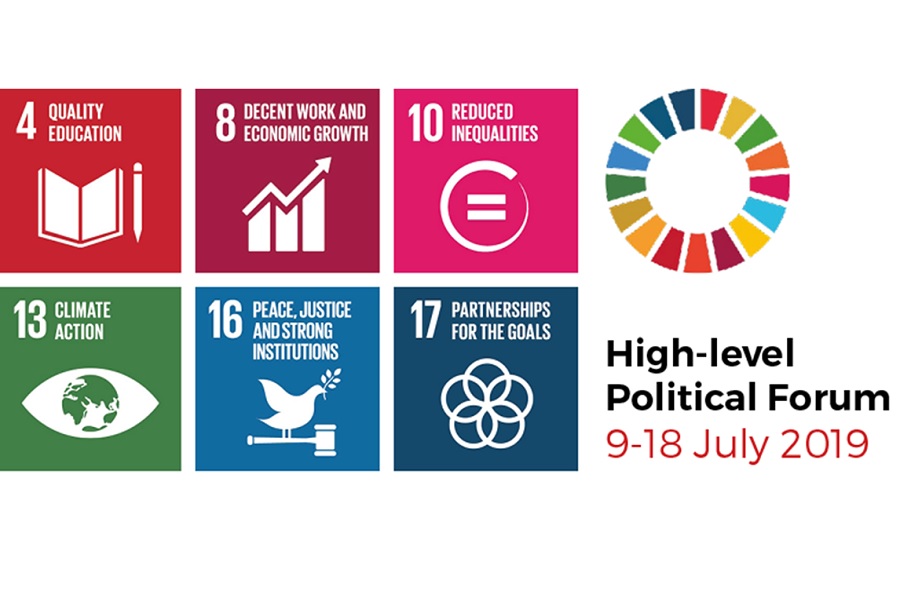
Brazil does not participate at the SDG 4 review in the UN
July 16, 2019In a session to review the status of implementation of the Sustainable Development Goal (SDG) 4, which seeks to ensure inclusive education, with equity and quality, and promote lifelong learning opportunities for all, Brazil has not pronounced.
“Brazil withdrew because it presents setbacks in terms of Human Rights. Our teachers do not have proper conditions to teach, many students do not learn and we have millions of people without access to school or illiterate,” analyzed Daniel Cara, general coordinator of the National Campaign for the Right to Education (CNDE), who follow-up the United Nations High Level Political Forum (UN), a platform for monitoring the SDGs worldwide.
The CNDE integrated the delegation of the Latin American Campaign for the Right to Education (CLADE) in the Forum, and presented a report on the status of SDG 4 in Brazil to the UN Economic and Social Council (ECOSOC) and the Human Rights Council (OHCHR). It also participated in the preparation of collective civil society reports at national, regional and global level, on the SDGs.
The Sustainable Development Goals were adopted by the UN Member States in September 2015, and must be achieved by 2030.
“We are on the eve of completing a third of the period of the agenda and the evaluation is that we have advanced less than necessary to guarantee the human rights which we seek to move forward. In addition, the progress that has been observed remains uneven, and several developing countries have faced political and economic crises that even show setbacks in relation to the commitments assumed at the international level. Unfortunately, Brazil is one of those cases,” said Andressa Pellanda, executive coordinator of the National Campaign.
>> See the full report in Portuguese and English
Read more:
Brasil: In a message to the UN, National Campaign expresses concern about the rights of children and adolescents
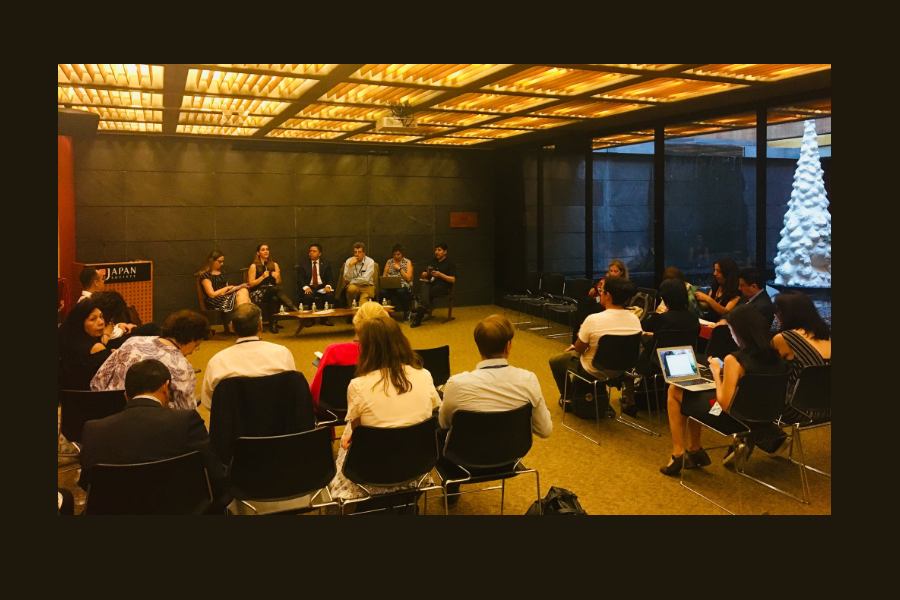
Side event during the UN Forum: “We must educate for citizenship and democracy”
July 11, 2019“One of the main challenges is to guarantee educational quality and, for that, reflect on what kind of quality we want, towards the guarantee of an education that trains people for global citizenship and the strengthening of democracy.” This was one of the reflections that were shared during the high-level discussion “Human rights at risk: impacts for education in Latin America and the Caribbean.” The meeting was held yesterday (July 10) in New York, in the context of the UN High-Level Political Forum, and as an initiative of the Latin American Campaign for the Right to Education (CLADE).
The participants in the opening table of the event were: Héctor Alejandro Canto Mejía, Deputy Minister of Education of Guatemala; Naiara Costa, from the Division of the SDGs (Sustainable Development Goals), Department of Economic and Social Affairs of the United Nations (UN / DESA); Roberto Bissio, from Social Watch; and Camilla Croso, general coordinator of CLADE.
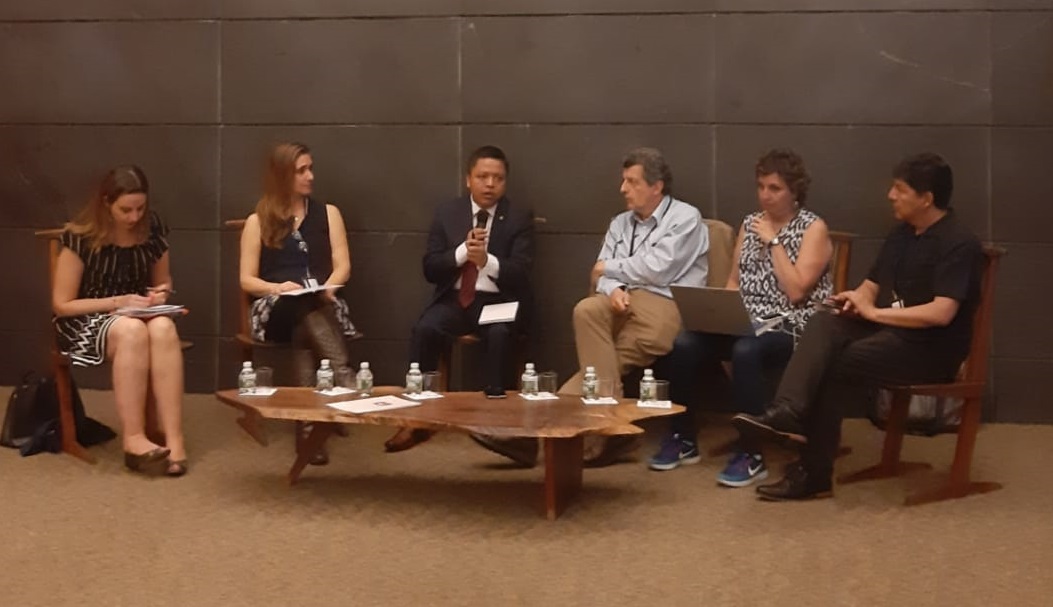
During the discussion, the challenges of education in the region were addressed, in a context of setbacks for human rights and multilateralism, as well as of fragility of democracies. Cultural diversity; school coverage in primary and secondary school; teacher training; migration; respect for diversity and gender equality in education; educational financing; the increased privatization, while public systems are stigmatized; and the challenge of guaranteeing a quality lifelong education for all, were topics highlighted in the presentations.
“All human rights are at risk when we do not comply with the human right to education,” said Camilla Croso at the opening of the conversation.
Next, the Deputy Minister of Education of Guatemala, pointed out some challenges for the realization of the human right to education in his country. “The main challenges are guaranteeing coverage and, in parallel, advancing the rate of completion, transition from primary to secondary school, quality and equity in the education system,” he said.
He added as another challenge the guarantee of quality lifelong education for all. “An education that provides training for global citizenship and democracy.”
Roberto Bissio emphasized the importance of ensuring human rights and protecting the people who defend these rights beyond the achievement of the Sustainable Development Goals. “The central question is to what extent the SDGs legitimize the struggle for rights. We can not forget that in Latin America and the Caribbean human rights defenders are at constant risk,” he said.
Naiara Costa addressed the role of the United Nations and multilateralism for the realization of human rights and the promotion of sustainable development. “To achieve the SDGs, it is essential to connect the global level with the local, national and regional levels”, he said.
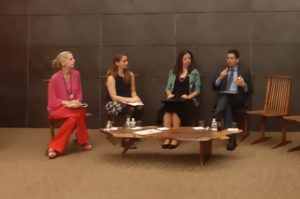
Debate
Representatives from the following organizations: Argentine Campaign for the Right to Education; Bolivian Campaign for the Right to Education; Campanha Nacional pelo Direito à Educação – Brazil; Forum for the Right to Public Education in Chile; Salvadoran Network for the Right to Education; Collective of Education for All of Guatemala; Forum Honduras Honduras; Peruvian Campaign for the Right to Education (CPDE); Socio-educational Forum (Foro Socioeducativo), of the Dominican Republic; Popular Education Network among Women of Latin America and the Caribbean (REPEM); ILGALAC (International Lesbian, Gay, Bisexual, Trans and Intersex Association for Latin America and the Caribbean); Global Campaign for Education; ActionAid International; and EDUCO, among other organizations and networks, participated in the debate.
Vernor Muñoz, from Global Campaign for Education, recalled, as an obstacle to education and other human rights, the criminalization of social protest, especially of students and teachers in different countries of Latin America and the Caribbean, which also operates in the symbolic field and in the media.
Roberto Baeza, from ILGALAC, spoke about comprehensive sexual education and school violence against LGBTI people. “Gaps in inequality in education and other sectors are widened with the advance of fundamentalisms. The trans population does not have access to their right to education, they are who most leave the school because of experiences of discrimination,” he said.
Marcela Browne, from the Argentine Campaign for the Right to Education, said that in the debate on the fulfillment of the right to education, it is necessary to ask: “What are the risks of external debt and tax fraud for educational justice in the region?
New document
During the event, CLADE launched the publication “Civil Society Advocacy for the Human Right to Education: Stories and Lessons Learned from Latin America and the Caribbean – Volume 3”.
Read more and download the document here
CLADE at the UN High-Level Political Forum
Almost four years after the adoption of Sustainable Development Goal 4 (SDG 4), about education, the United Nations High-Level Political Forum (HLPF) 2019, official platform for monitoring the Sustainable Development Goals (ODS) internationally, took place from 9 to 18 July in New York.
In this edition, the HLPF focuses on the revision of SDG 4, as well as goals 8 (decent work and economic growth), 10 (reduction of inequalities), 13 (climate action), 16 (peace, justice and solid institutions) and 17 (partnerships to achieve the objectives).
CLADE participated in the HLPF and its side events with a delegation of 14 people from 9 countries: Argentina, Bolivia, Brazil, Chile, El Salvador, Guatemala, Honduras, Peru and the Dominican Republic.
CLADE members in the countries that were reviewed by the UN this year (Guatemala and Chile) prepared reports with contributions on the status of SDG 4 at national level. In addition, CLADE members from Brazil and El Salvador prepared reports, highlighting the challenges of education in their territories, since these countries had indicated that they would participate in the review process carried out by the UN, but finally this did not happened.
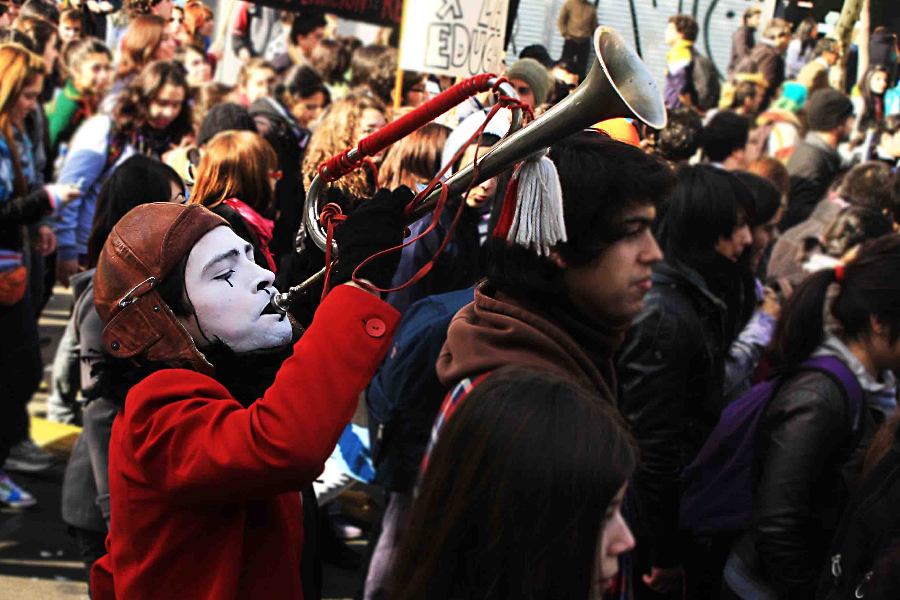
In new publication, CLADE shares experiences, strategies and lessons learned on the fight for the right to education
July 10, 2019The Latin American Campaign for the Right to Education (CLADE) launches the publication “Civil Society Advocacy for the Human Right to Education: Stories and Lessons Learned from Latin America and the Caribbean – Volume 3”.
The document is available:
In this volume, members of CLADE tell their experiences on the fight for the right to education: the challenges, advances and lessons learned, the strategies and recommendations that remain for other civil society movements and organizations. It presents cases of advocacy, communication, research and mobilization in 10 countries of Latin America and the Caribbean, as well as 3 regional experiences, driven by CLADE and 2 regional networks that are members of the Campaign: Espacio sin Fronteras and ALER.
The document is the result of a permanent effort by CLADE, to record and provide visibility to the journey of its members in their advocacy and capacity building efforts; and, on the other hand, to promote the reflection on their success and mistakes, in a process of self-evaluation and capacity building by the network.
“In times when we witness a growing democratic weakness in Latin America and the Caribbean, when laws are passed to hinder the right to demonstration and social participation, when social movements, activists and students are persecuted and criminalized, and there are so many restrictions to participation, it is worth showcasing civil society action and its positive impact on education policies,” says CLADE.
The Campaign distributed the publication, during its participation in the High-Level Political Forum, which takes place until July 18 in New York, with an emphasis on reviewing the status of compliance with Sustainable Development Goal 4, related to education.
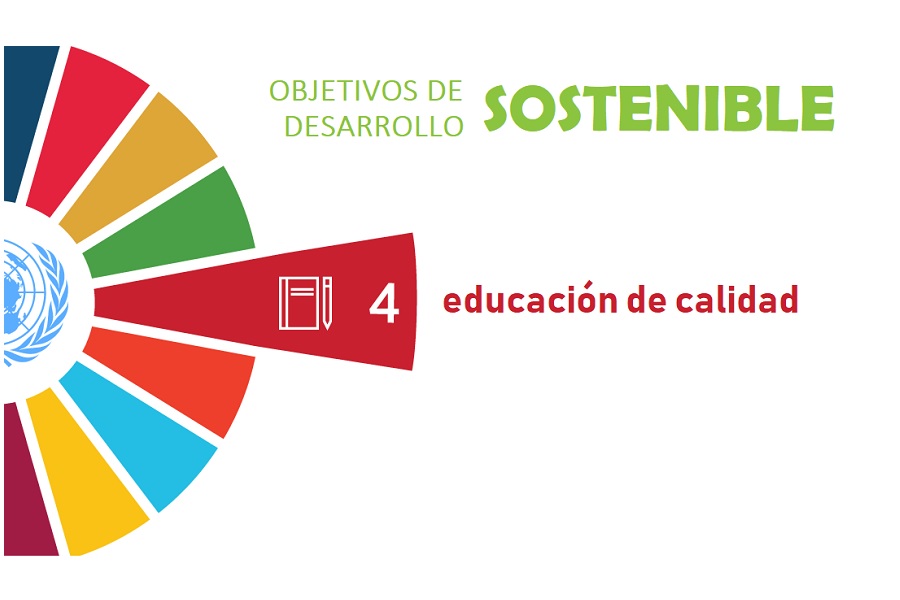
Organizations from Latin America and the Caribbean demand UN to include SDG 4 in the draft of the declaration of the High Level Political Forum
June 5, 2019“It is with great concern that the networks and civil society organizations that work for the realization of the human right to education in Latin America and the Caribbean review the “zero draft” of the Political Declaration of the High Level Political Forum (HLPF) and note the total absence of State commitments in education and the acknowledgement of its crucial importance in the scope of the SDGs, human rights, democratic strengthening and peace”.
These words were presented in a letter signed by the Latin American Campaign for the Right to Education (CLADE) and other networks, coalitions and civil society organizations in Latin America and the Caribbean, which was sent today (6 June) to United Nations authorities, with the purpose of advocacing for the inclusion of references to the SDG 4 in the Political Declaration of the High Level Political Forum.
The FPAN is the official platform for monitoring compliance with the SDGs worldwide, and is carried out within the UN, focusing each year on the monitoring of specific Objectives of the Agenda, as well as the analysis of voluntary national reviews presented by the Member States
The next edition of the Forum will take place from July 9 to 18 of this year in New York, with an emphasis on the revision of SDG 4, as well as Objectives of number 8 (decent work and economic growth), 10 (reduction of inequalities), 13 (action for climate), 16 (peace, justice and solid institutions) and 17 (partnerships to achieve the objectives).
With the letter sent to the UN, organizations and networks demand the inclusion of SDG 4 in the next versions of the declaration. “We hope that this absence will be overcome in the following versions of the Declaration, so that the United Nations can transmit to the whole world, in a clear and forceful way, the importance of education for peace, justice, environmental sustainability, dignity, as well as the overcoming of patriarchy and all forms of discrimination. Education is key to promoting the implementation of the 2030 Development Agenda in its integrity, and we hope this be acknowledged by the High Level Political Forum”, says Camilla Croso, general coordinator of CLADE.
Read the full letter below.
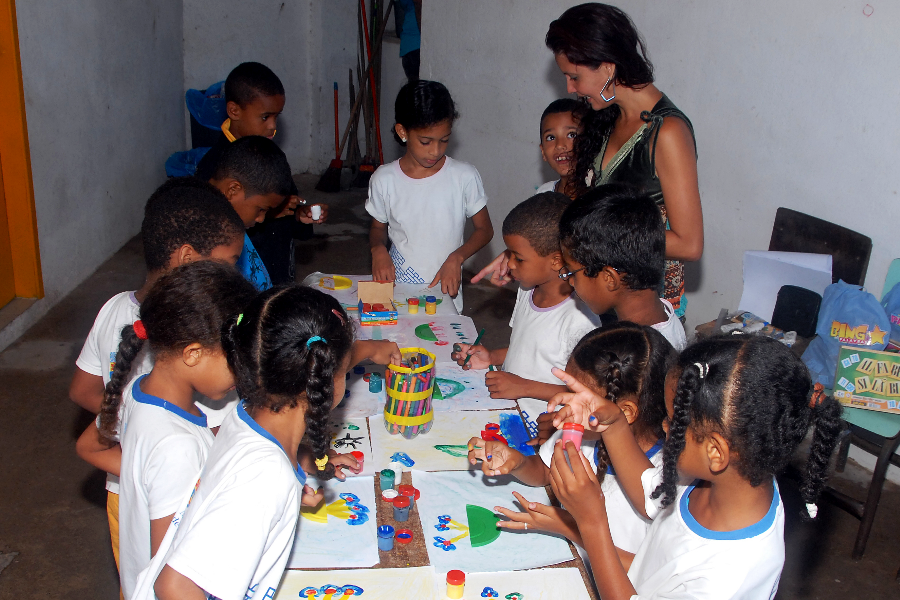
Brazil: In a message to the UN, the National Campaign expresses concern about the rights of children and youth
June 3, 2019In response to a call from the Office of the United Nations High Commissioner for Human Rights (OHCHR), the National Campaign for the Right to Education from Brazil sent to the agency information on the state of children’s rights in the country regarding the areas that will be the focus of the Sustainable Development Goals (SDGs) review in July this year.
The review will take place at the UN High-Level Political Forum (HLPF), to be held July 9-18 in New York, with a focus on SDG 4 (on education) as well as goals 8 (decent work and economic growth), 10 (reduction of inequalities), 13 (climate action), 16 (peace, justice and solid institutions) and 17 (partnerships to achieve the objectives).
OHCHR is preparing a report on children’s rights and the SDGs to be presented at the HLPF and, to contribute to its content, a call was made asking civil society to submit their diagnoses and recommendations.
Inputs sent by the National Campaign to the agency indicate strong risks that SGDs 4, 8 and 16 will not be achieved within the expected period, in the country, due to a series of measures implemented by the current government.
Furthermore, they present alarming data on the human rights situation in Brazil, such as: non-compliance with the National Education Plan (PNE, by its Portuguese acronym) 2014-2024; the reduction of public expenditures on education and the non-implementation of the Initial Student-Quality Cost (CAQi, by its Portuguese acronym) and Student-Quality Cost (CAQ, by its Portuguese acronym) mechanisms, which establish parameters for the financing of quality public education; thousands of children and adolescents without access to basic education; the advancement of the “Escola sem partido” (School without a Party) initiative, which intends to prohibit the discussion of issues such as politics, racial equality and gender equality and identity in schools; a reductionist perspective of early childhood education and setbacks for inclusive education and the inclusion of people with disabilities in the public system; the attempt to regulate home schooling as a way of encouraging the privatization of distance education and avoiding socialization and students’ interaction in plural contexts; the worsening situation of children and adolescents in precarious working conditions, with a labor reform that flexibilizes rights; and the closure of spaces for civil society participation in public policies, as well as the elimination of participatory administrative bodies, seriously affecting areas such as: human rights, racial equality, indigenous peoples, rural populations, LGBTI community and the environment.
“In this alarming context, we request that the OHCHR recommends the Brazilian State to restorate and strengthen democratic instances of civil society participation, as well as the reversal of current setbacks. We also demand that the government respect the UN Convention on the Rights of the Child and the observations made to Brazil by the Committee that monitors the Convention. The Committee recommended that the Brazilian State assume its responsibility to guarantee adequate financial resources for the implementation of the National Education Plan, including situations of economic crisis and political instability”, said Andressa Pellanda, executive coordinator of the National Campaign for the Right to Education.
In the report sent to the UN, the Campaign presents recommendations for the guarantee of the right to a lifelong free, inclusive, equitable and quality education for all, from a perspective of rights.





